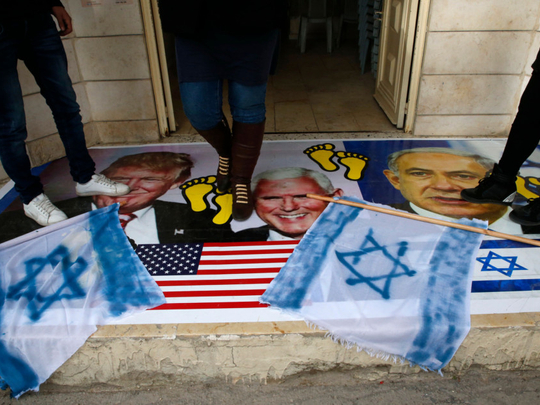
Washington: US Vice-President Mike Pence is set to receive a cooler reception from Arab leaders on a Middle East trip next week than he once expected, after US President Donald Trump earlier this month recognised occupied Jerusalem as the capital of Israel.
Palestinian leaders cancelled meetings with Pence and he will not visit Bethlehem and the Church of the Nativity in the West Bank — a particularly meaningful stop for the evangelical Christian vice-president. He’ll spend less time on the ground in Egypt than he’d hoped, with a trip to the Pyramids of Giza and a meeting with the leader of Coptic Christians both removed from his itinerary.
Pence knew as he planned his trip that it was possible Arab and Palestinian leaders would cancel their meetings in response to Trump’s Jerusalem declaration.
He was briefed on potential unrest and other negative consequences of the announcement.
But he was cautiously optimistic that Palestinian National Authority President Mahmoud Abbas and other critics of Trump’s decision would proceed with the meetings, ultimately regarding face time with the US vice-president as both strategically valuable and an opportunity to express their disappointment in person, a person familiar with the matter said.
Instead, he’s being snubbed.
“The Palestinian position is clear: the vice-president is not welcome here and there will be no meeting with him, after Trump’s decision,” said Wasel Abu Yusuf, a member of the Palestine Liberation Organisation’s policy-making executive committee.
“There is no talk with the US side about the peace process if the US administration does not retreat from President Trump’s decisions about [occupied] Jerusalem. Their role as a mediator is done.”
Pence was one of the foremost proponents in the Trump administration for a declaration that occupied Jerusalem is Israel’s capital and the relocation of the US embassy.
His argument bested those of Secretary of State Rex Tillerson and Defence Secretary James Mattis, both of whom opposed the idea, according to people familiar with the internal debate.
The vice-president stood stoically behind Trump’s right shoulder as he made his televised announcement, an unmistakable signal to the president’s evangelical supporters.
The vice-president intends to “reaffirm the United States’ commitment to its allies in the Middle East and to working cooperatively to defeat radicalism,” said Pence spokeswoman Alyssa Farah.
Pence has described himself as “a Christian, a conservative and a Republican, in that order” and he’s been outspoken about his deep devotion to Israel as part of his religious beliefs since long before Donald Trump’s entrance into politics. But his advocacy for Trump’s occupied Jerusalem decision has taken on a political aspect amid speculation about the administration’s ultimate goals for the region and Pence’s own presidential ambitions.
In remarks in May commemorating Israel Independence Day, Pence explained that “my Christian faith compels me to cherish Israel as well as our deep alliance and historical ties” and that “the songs of the land of the people of Israel were the anthems of my youth when I was growing up.”
Pence grew up Catholic and became evangelical Christian later in life.
In July, Pence told a Christians United for Israel summit in Washington: “I promise you that the day will come when President Donald Trump moves the American Embassy from Tel Aviv to Jerusalem.”
Itinerary
Pence’s four-day trip to the region will begin on Tuesday, a few days later than initially planned in order to accommodate the US Senate, which may vote on a tax overhaul earlier that day.
He’ll stop in Egypt, Israel, and finally at Ramstein Air Force Base in Germany for a holiday visit with US service members, according to the vice-president’s office.
Egyptian President Abdul Fattah Al Sissi will keep a meeting with Pence despite his criticism of the occupied Jerusalem announcement.
The vice-president will meet with Israeli leaders including Prime Minister Benjamin Netanyahu, deliver a speech to the Israeli parliament, the Knesset, and visit Al Buraq Wall which Jews refer to as the Western Wall in the Muslim holy site of Al Haram Al Sharif.











